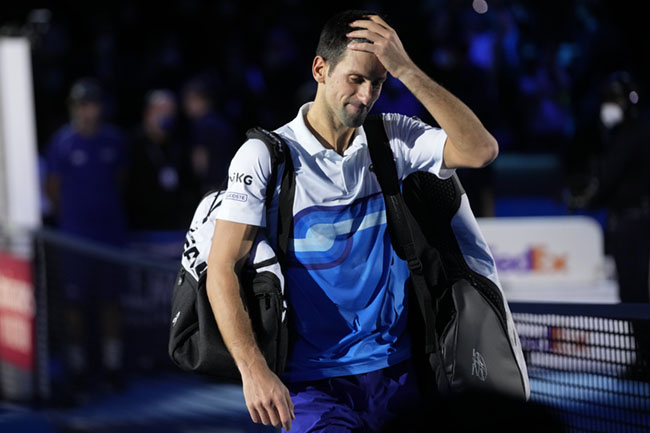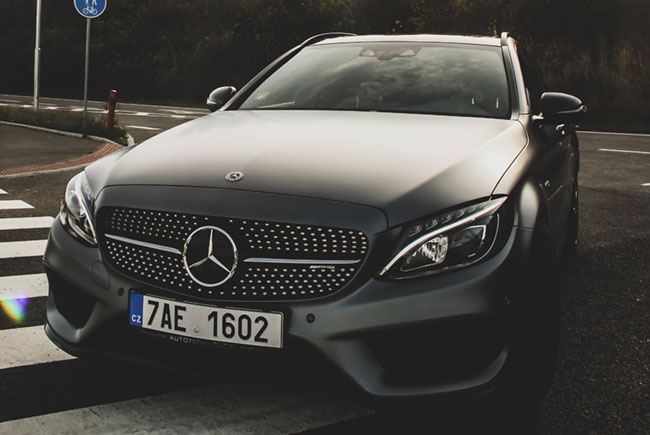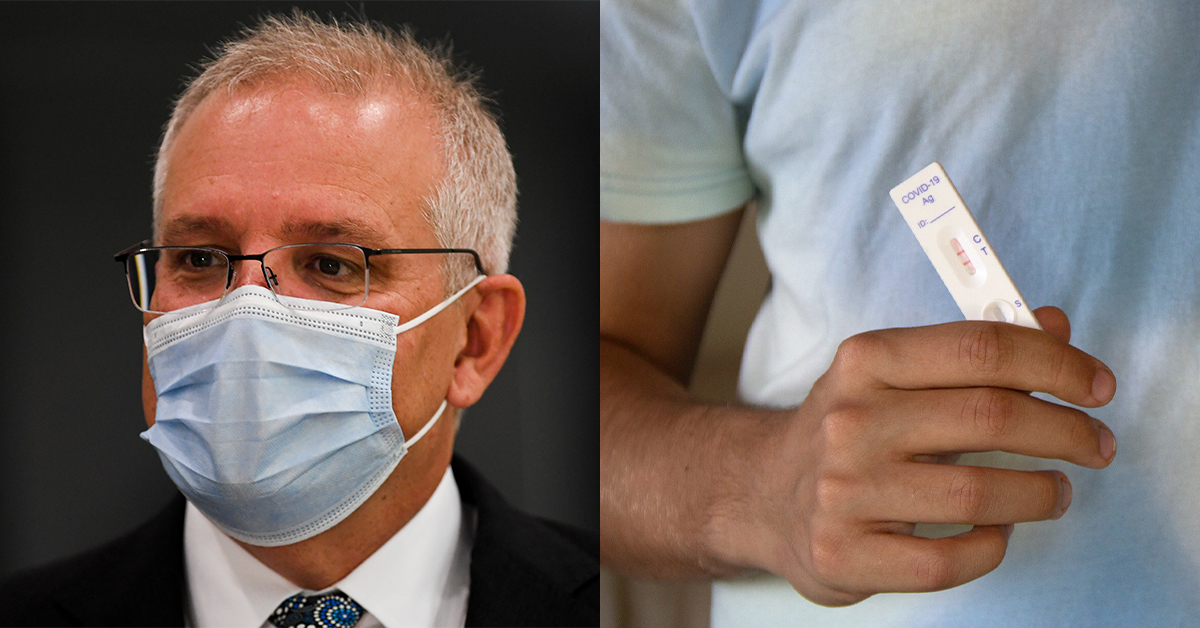Selected
- Details
- Written by Grant Broadcasters
- Category: Selected
- Hits: 117

Novak Djokovic of Serbia leaves the court in Italy in November 2021 (AP Photo/Luca Bruno)
Nine-time Australian Open champion Novak Djokovic is set to be deported after his visa was revoked by the Australian government.
The world No.1 is set to file an injunction to stop the deportation.
Djokovic was left stranded overnight in a police-guarded room at Melbourne airport amid a visa mix-up that could derail his hopes of defending his Australian Open title.
The extraordinary, escalating soap opera surrounding the world's best men's player arrived to a political storm and a visa controversy as he jetted into Tullamarine Airport after a 14-hour flight from Dubai.
Djokovic may have been armed with the vaccination exemption that will allow him to compete in Melbourne but apparently not with the correct visa to enter the country.
Djokovic was still awaiting permission early on Thursday after it emerged that his team had applied for a visa that does not allow for medical exemptions.
That prompted the local government of Victoria to say it would not support Djokovic's application, putting his fate in the hands of the federal government and Prime Minister Scott Morrison.
The situation left Djokovic's father Srdjan telling the Serbian B92 internet portal: "Novak is currently in a room which no one can enter. In front of the room are two policemen."
Djokovic's entourage includes his coach, 2001 Wimbledon champion Goran Ivanisevic, who stated the obvious in a social media post after their arrival.
"Not the most usual trip from Down Under," he posted on Instagram with a selfie from an airport lounge, accompanied by face-palm and mind-blown emojis.
Djokovic, never a stranger to controversy, has found himself the subject of a major public backlash in Australia after revealing on Tuesday that he'd received the vaccination exemption which allowed him to bid for a record 21st major title Down Under.
But amid the storm, tournament director Craig Tiley insisted the world No.1 was getting no special treatment and Morrison said on Wednesday that Djokovic "would be on the next plane home" if he could not provide the proper evidence for his exemption.
Djokovic was embroiled in entry problems as Victoria's Acting Sports Minister Jaala Pulford confirmed the state government did not support his visa application - declaring on Twitter "visa approvals are a matter for the Federal Government, and medical exemptions are a matter for doctors" - effectively putting the 34-year-old's fate in the hands of federal government.
It was not clear whether the federal government would allow Djokovic's entry with a Border Force spokesperson quoted by local media saying: "(The) Victorian government claims are incorrect, ABF did not request (the) Victorian government support a visa.
"ABF reached in to Victorian government to validate their public statements about their support for his entry, and whether Victoria had further information related to his medical exemption documentation."
As Djokovic was left in isolation to ponder this astonishing start to his trip, there were also growing demands for him to clear up any doubts over the reasons for why he'd been given the exemption.
Rod Laver, fearing that Djokovic's participation on the court named after him at Melbourne Park could see passions running high, wants the Serb to open up.
"I think it might get ugly. I'd think the Victorian people would be thinking, 'Yes I'd love to see him play and compete but at the same time, there's a right way and a wrong way'.
"If he's got a reason for (the exemption) then ... we should know it."
Australia's world No.1 Ash Barty said: "I think it's a tough one. As we've seen a little bit in the last day or so, from the Australian public, I know how hard it has been for Australians... but in particular Victorians have had a real rough trot over the last 18 months and two years.
"I understand why they may be frustrated with the decision.
"Ultimately, I have no interest in speaking about Novak's medical history. It's not my decision. Those decisions are made. They're completely out of my control."
With agencies
© AAP 2022
- Details
- Written by Grant Broadcasters
- Category: Selected
- Hits: 113

Mercedes-Benz says it is recalling hundreds of thousands of cars due to a technical fault.
Certain vehicles in the GLE/GLS, C-Class, E-Class, S-Class, E-Class, GLC, CLS and G-Class series with diesel engines could develop a leak, the Stuttgart-based luxury carmaker said on Wednesday.
As a result of the problem, a rise in component temperature cannot be completely ruled out, it added.
More than 800,000 vehicles worldwide are affected, according to reports in Germany's Bild tabloid and Handelsblatt business daily.
Mercedes-Benz would not comment on the exact figures.
The company, a subsidiary of Daimler, pointed out that the recall had already been published in November.
Until taken to a workshop for repair, "the vehicle affected by the recall should be driven with particular caution and use should be limited to the minimum necessary," it said.
The replacement of the affected parts is scheduled to start in mid-to-late January. This also depends on the release of relevant software and the availability of parts.
© DPA 2022
- Details
- Written by Grant Broadcasters
- Category: Selected
- Hits: 121

Scott Morrison has ruled out making rapid antigen tests free, despite growing calls to make them available for everyone.
Following widespread shortages of the rapid tests and large queues at PCR testing clinics across the country, the prime minister said the tests wouldn't be rolled out freely.
"What we're focused on is ensuring that the tests are there for those who need them for health reasons," Mr Morrison told reporters in Canberra.
"The tests are free if you require one and are required to have one because you're a close contact or you're symptomatic."
Mr Morrison said as many as 160 million rapid tests would soon be arriving in Australia.
ACT Chief Minister Andrew Barr hit out at the prime minister ahead of national cabinet meeting, saying states and territories were working together in the absence of Commonwealth assistance.
Mr Barr also said the prime minister's plan to subsidise the cost of rapid tests for concession holders "needs a little bit of work".
"(Rapid antigen tests) should be free for all public health services," he said on Wednesday.
"(Regarding) workplace(s) and in settings like schools, that is something on the national cabinet agenda and I think even the prime minister is on board in that context."
Mr Morrison was expected to bring to national cabinet a plan where welfare recipients and pensioners receive cash payments for up to five rapid tests, or potentially more if states and territories provide funds.
People would need to meet eligibility requirements to qualify for the subsidy.
However, Opposition Leader Anthony Albanese has called on the government to make the tests free for everyone, labelling the Commonwealth's plan as a failure.
"It's very clear the simplest way to do it is to make tests free and make them available," he told reporters in Sydney.
"People are crying out for action, the economic consequences of this government's failure to put in place a proper system are there for all to see."
Mr Albanese had previously called for the rapid tests to be made affordable but has since changed to wanting tests to be free.
"We've considered the options and the clear and simplest, most cost-efficient way is to make tests available," he said.
Rapid tests have been made free in countries such as the US, UK and Singapore.
The Public Health Association of Australia and Australian Medical Association have also added their voices to the chorus for free rapid tests.
Mr Morrison said Omicron had caused a major disruption in Australia, and that making the rapid tests free would not immediately solve issues.
"There's no silver bullet, making everything free is not a silver bullet," he said.
"You've just got to work the problem, work it together and push through, and that's what we'll be doing at national cabinet."
National cabinet was also due to consider whether to change the criteria for who is included in hospitalisation figures.
The discussion comes after it was revealed earlier in the week that some people were being admitted to hospital for non-virus related health issues before later testing positive.
On Tuesday, there were 176,223 boosters administered across the country, the highest daily number for the third doses.
More than 64,000 COVID cases were reported nationally on Wednesday, the highest daily number since the pandemic began.
NSW registered a high of 35,054 cases and eight deaths, while there 17,636 cases and another 11 deaths in Victoria.
Tasmania had a record of 867 infections, with Queensland reaching 6781, SA with 3493, the ACT with 810 and NT 117.
© AAP 2022
Images: AAP Image/Lukas Coch & Alex Koch/Pexels- Details
- Written by Grant Broadcasters
- Category: Selected
- Hits: 106
NSW will roll out Pfizer-produced COVID-19 vaccinations for children between five and 11 years from next week.
The vaccine is a special formulation and will be delivered in doses small enough to generate an immune response that's as strong as a full adult dose.
The children will be given two doses eight weeks apart with the aim of preventing them from developing severe illness or transmitting the virus to another person.
"We know it's safe," NSW Chief Paediatrician Matthew O'Meara said on Wednesday.
"It's been tested in thousands of children in clinical trials and millions of doses of first and second doses have been given in other countries."
Dr O'Meara said any side effects were minor.
"Many kids complain about a bit of a sore arm for a day or two afterwards," he said.
"But the headache, muscle ache, fever, chills and nausea ... is pretty uncommon in children and can be managed with the usual pain-relieving medications."
Dr O'Meara acknowledged parents may be weighing up the risks and benefits of giving a young child a vaccine but stressed COVID-19 was usually mild in children.
"In fact, many children will have no symptoms at all and a large number will have mild symptoms of a cough, cold, runny nose and fever that lasts up to five days."
But some children can become seriously ill and require hospitalisation if they aren't vaccinated. About one or two in every 100 would need to go to hospital and one in 1000 would end up in intensive care.
"We expect those numbers to be lower with the Omicron strain but it's still not an entirely benign disease," Dr O'Meara said.
Premier Dominic Premier says the rollout will ensure schools open on time for the first day of the new term in 2022.
"We want a seamless transition back into the school year," he added.
Currently, vaccinations are offered to children aged 12 to 15 and so far 81.4 per cent have had their first dose and 78 per cent have had two.
In the 16 years and older cohort - which includes adults - 95 per cent have had one dose and 93.6 per cent have had two.
NSW Health Deputy Secretary Susan Pearce said the vaccine take-up in the 12-15 years group had been "really rapid" and she'd like to see the same again in the five- to 11-year-old cohort.
© AAP 2022
Image: SELF Magazine / Flickr
Page 100 of 191
